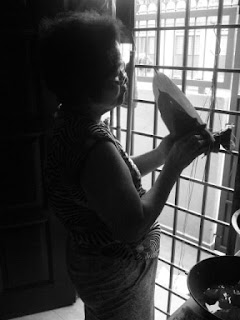





I am heavily obsessed with Ruven Afanador's photography!Oh my god,I spent 2 hours scurrying and pouring over his jaw dropping,eye popping,breathtaking work, until I couldn't find anymore images,ended up with this huge cramp up my ass.


























 At the Anexe,Central market
At the Anexe,Central market
 I went to check out Gostan Forward,a solo performance by Marion D' Cruz,which represents an excavation of Marion D'Cruz's dance memory.Gostan forward literally means the somewhat stagnant state of contemporary dance in Malaysia.There are pioneers and innumerous new talent who are trying to push the dance scene forward,where at the same time there are traditionalists who are moving it backwards.It was so beautiful it left me speechless.I never knew dance could be so moving,especially when she performed Terinai(a traditional malay wedding dance).She quoted Malay dance being the most challenging of all dance forms,as you had to feel the soul of it.There was also an unconventional dance form where she had to depict an emotionally tormented prostitute by incoperating dysfunctional hand gestures and body movements.Really brings a chill down to the spine.Oh,and she once spent 11 months choreographing a dance piece that was only 30 minutes long!!For me, it was a very eclectic and passionate performance.If only i were a dancer!!I wish i could understand the language of dance in depth.
I went to check out Gostan Forward,a solo performance by Marion D' Cruz,which represents an excavation of Marion D'Cruz's dance memory.Gostan forward literally means the somewhat stagnant state of contemporary dance in Malaysia.There are pioneers and innumerous new talent who are trying to push the dance scene forward,where at the same time there are traditionalists who are moving it backwards.It was so beautiful it left me speechless.I never knew dance could be so moving,especially when she performed Terinai(a traditional malay wedding dance).She quoted Malay dance being the most challenging of all dance forms,as you had to feel the soul of it.There was also an unconventional dance form where she had to depict an emotionally tormented prostitute by incoperating dysfunctional hand gestures and body movements.Really brings a chill down to the spine.Oh,and she once spent 11 months choreographing a dance piece that was only 30 minutes long!!For me, it was a very eclectic and passionate performance.If only i were a dancer!!I wish i could understand the language of dance in depth.